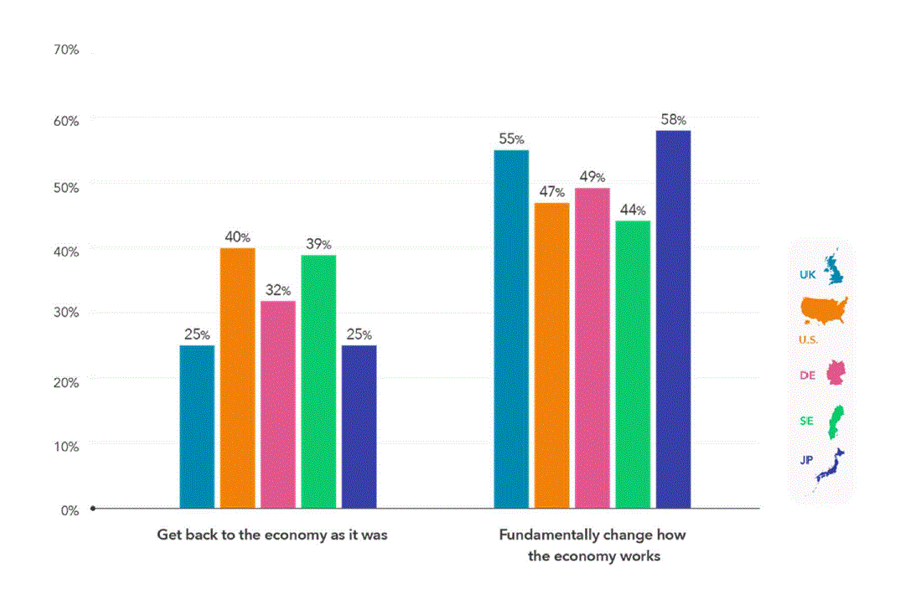New York, New York, May 12, 2020 – International opinion survey, conducted by Kekst CNC, shows narrow gap between Americans who want fundamental change to the economy and those who want return to pre-crisis state. Data shows rising call to avert economic damage and a continuing decline of confidence in federal government response
Executive compensation becomes key issue for companies
Only slightly more Americans (47%) prefer fundamental change to the economy post-crisis versus a return to the system as it was (preferred by 40%), according to the May update of the international opinion survey tracker conducted by Kekst CNC, a leading global strategic communications firm.
Alongside focusing on a return to normalcy, Americans believe preparing for future pandemics – not necessarily increasing funding for key workers and looking after the most vulnerable in society – should be a key economic priority moving forward. Americans are also more likely than those in other nations to prioritize growing the economy.
Graph. Americans more likely than those in other countries to want to see the economy return to how it was

Table. Americans name pandemic preparation as key priority for the future
| % Americans who rank measure: | Pandemic preparation | Grow the economy | Get back to normal | Looking after most vulnerable | Funding for key workers |
| 1st priority | 17% | 12% | 15% | 10% | 6% |
| 2nd priority | 13% | 12% | 10% | 10% | 9% |
| 3rd priority | 14% | 12% | 10% | 8% | 9% |
Importantly, the data also shows that while a majority of Americans (57%) continue to prioritize saving lives over protecting the economy, a growing number (27%, up from 20% last month) now believe the government should focus on averting an economic recession or depression, even if it means the disease will spread. High levels of concern persist about the impact of the virus to the economy.
According to the findings, Americans’ reported confidence in the federal government’s response has continued to decline, from a net fall in confidence of 6% last month to a net fall of 12% in May. This trend is fueled by both Democrats and Republicans, with only 32% of Republicans saying they have more confidence in central government compared to 43% last month. The World Health Organization (WHO) has also seen a sharp increase in the number of people who say they have less confidence in it (from 21% last month to 30% now). This is mainly among Republicans, mirroring President Trump's remarks about defunding the organization.
The research, carried out among a representative sample of 5,000 adults, including 1,000 in the U.S. between April 27th and May 1st, alongside similar numbers in the U.K., Sweden, Germany, and Japan, also found persistent belief that businesses are stepping up in response to the crisis (including 59% of Americans).
However, Americans are beginning to call for bolder steps from businesses: 1 out of 3 Americans prioritize executive pay cuts above other initiatives, even above manufacturing hospital equipment and providing cheaper goods/services for the most vulnerable (prioritized by 15% and 16% respectively).
Commenting on these findings, Nicholle Manners, Global Head of Knowledge, Insights, Research & Analytics (KIRA) at Kekst CNC, said:
“One of the most striking findings from this research is the split nature of Americans’ responses. America’s expanding and enduring cultural divide informs responses throughout—leaving leaders to grapple with tough questions about the type of economy and country we want coming out of this crisis. Businesses, especially, will need to consider these questions thoughtfully, with an eye toward diverse consumer preferences.”
The U.S. in International Context (as of the time the latest survey was conducted)
- American workers remain acutely concerned about the impact of coronavirus on the economy and on their own jobs. Almost one in four Americans say they expect to lose their job, and one third say they expect their company to collapse. Younger American workers face the biggest threat to their economic situation, with 38% of 18-24 year old workers saying they expect to lose their job, and more than half – 52% - saying they are worried that the company they work for might collapse.
- The public is equally split on believing that government support for business is getting through to those that really need it, with 34% saying it is and 34% saying it is not.
- The U.S. is the country where the fewest people think the impacts of the virus will last a long time, among those countries where the survey was conducted. Though more think it will last longer than they did last month, 34% of Americans expect the impact of the virus on their own life to last more than a year, and 43% believing the impact on the U.S. to last beyond a year.
- Americans also expressed their desire for less of a change to the economy after the crisis compared to other nations. Specifically, Americans are less likely than their European counterparts to want to see more funding for key workers (only the top priority of 6%) or to look after the most vulnerable in society (10%), with more of a focus on growing the economy (12%) and reducing unemployment (12%).
Methodology and Full Results
- Nationally representative sample of 1,000 adults in The United States, 1,000 adults in Great Britain, 1,000 adults in Germany, 1,000 adults in Sweden, and 1,000 adults in Japan
- Fieldwork took place April 27th – May 1st 2020
- Quotas and weights on gender, age, and region in each country
- Margins of error of +/- 3.3% for all countries
- Full results of the survey available at: https://www.kekstcnc.com/insights/covid-19-opinion-tracker-edition-2

